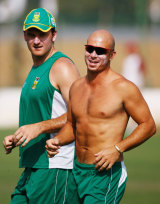
|

'The fact that Gibbs has admitted to his wrong doing but is still appealing, suggests he is unaware of the enormity of the issue'
© Getty Images
|
|
And another one bites the dust. Try telling Herschelle Gibbs that; "Sticks and stones may break my bones, but words will never hurt me."
Gibbs has been suspended for two Tests (now under appeal) for calling spectators at Centurion Park a few choice names. The fact that Gibbs's comments were captured by the stump microphones has caused much rancour and opinion is divided upon whether the penalty meted out to Gibbs is fair. In the end the short answer is probably the one I gave a television director who was apologising for allowing a few "unmentionables" I'd uttered, to go to air; "If I hadn't said them," I explained, "the words wouldn't have gone to air."
As a general rule if you don't use certain terms in your everyday language then they won't slip out in moments of anger.
Gibbs's suspension has brought into sharp focus an ugly trend that has been shadowing the game now for a few years; players being excessively abused by spectators. I'm not referring to the usual "can't bat", "can't bowl" or "'ave a go you mug" type comments that have been around for ages, but strident personal abuse.
The administrators have been their usual selves; jumping up and down and wringing their hands about the offensive nature of these taunts and threatening to have offending spectators fined and ejected from the stadium. Meanwhile, have they done enough to ensure their own house is in order?
No.
For a number of years the amount of chatter on the field has escalated from the odd, "I'll knock your adjectival block off," the occasional, "Well bowled, now give him another one," and a rare bit of clever gamesmanship, to an incessant stream of inane comments prior to and following each ball. Watching the recent triangular tournament out of Malaysia I was struck by the excessive amount of on-field comment heard through the microphones and not just from those players standing near the stumps.
It drove me mad sitting in the lounge room 4000 kilometres away from the game but no player or umpire did anything to put a stop to this rubbish. If I'd been in the batting side I would have started talking to the bowler from the non-striker's end, while he was running up to bowl. It wouldn't have been appreciated and would have drawn a rebuke from the umpire, but it would have got the message across that talking rubbish isn't the sole domain of the fielding side.
 Watching the recent triangular tournament out of Malaysia I was struck by the excessive amount of on-field comment heard through the microphones and not just from those players standing near the stumps. It drove me mad sitting in the lounge room 4000 kilometres away from the game but no player or umpire did anything to put a stop to this rubbish
Watching the recent triangular tournament out of Malaysia I was struck by the excessive amount of on-field comment heard through the microphones and not just from those players standing near the stumps. It drove me mad sitting in the lounge room 4000 kilometres away from the game but no player or umpire did anything to put a stop to this rubbish
 |
A batsman is entitled to some peace and quiet out in the middle. If a batsman is subjected to a barrage of comments the contest is heavily weighted in favour of the bowler as he has more team-mates supporting him and the willow-wielder generally only has one chance to succeed, while the leather-flinger has many.
Then there is the more important matter of incessant chat leading to something personal being said at the wrong time and an ugly incident erupting on the field.
In addition, it could be that fans are seeing and hearing what is going on and have decided they can be "part" of the contest out in the middle by wading into the opposition from the other side of the fence.
The players have also started doing a lap of honour after a game to thank the fans for their support. This may have seemed like a good idea at the time some marketing guru proposed it but I recall thinking when I first saw it happen at soccer matches many years ago, "It's not smart to thank fans excessively, because they'll start thinking they actually have an influence on the result of a game."
There was nothing wrong with playing good cricket and occasionally doffing your cap as a way of thanking fans for their applause and it wouldn't be a bad time to return to that principle.
The fact that Gibbs has admitted to his wrong doing but is still appealing, suggests he is unaware of the enormity of the issue.
Cricket can't bring an end to abusive behaviour; it is a public problem that can only be addressed by improved education and everybody resolving to do better. However, cricket can do more to ensure its own house is in order, because as we've just seen in the "Gibbs affair" words can be offensive and they do hurt.

